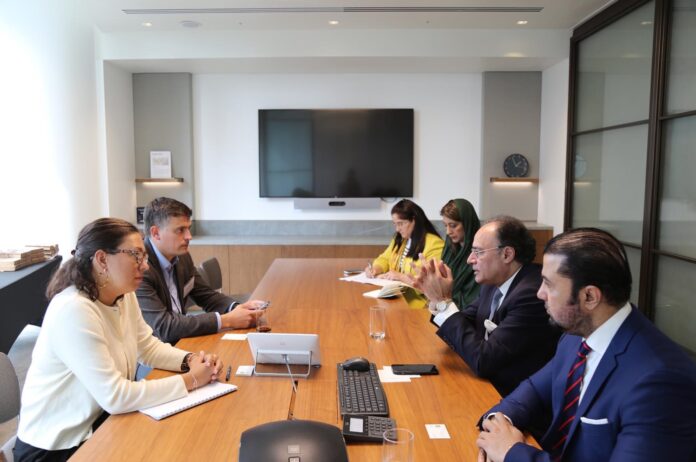- Amundi and Lion’s Head Global Partners reaffirm their interest in sovereign instruments, ESG-aligned investments, and supporting country’s Medium-Term Debt Management Strategy (MTDS)
A group of leading global investors, including Amundi, Lion’s Head Global Partners, and others, has expressed strong interest in Pakistan’s sovereign instruments and ESG-aligned investments. They also expressed significant interest in the country’s upcoming bond issuance plans and medium-term debt management strategy (MTDS).
Finance Minister Muhammad Aurangzeb held a strategic meeting with leading global investors in London, including Oliver Williams, Emerging Markets Fixed Income Portfolio Manager at Amundi, and Maud Le Moine of Lion’s Head Global Partners, to discuss Pakistan’s economic outlook, reform agenda, and future investment prospects, according to a release issued by the Ministry of Finance on Friday.
Minister Aurangzeb emphasized that Pakistan is not just reforming, but transforming. “Pakistan is open for business and for investors seeking impact, scale, and certainty — and Pakistan offers all three,” he stated.
Maud Le Moine of Lion’s Head Global Partners, a firm specializing in emerging market advisory, offered targeted technical support to help Pakistan strengthen its investor communications, enhance credit rating engagement, and implement energy sector modeling. Lion’s Head also reaffirmed its interest in supporting Pakistan’s MTDS.
Throughout the meeting, Finance Minister Aurangzeb addressed all investor questions candidly. The Finance Ministry acknowledged the offer and reiterated that any advisory engagement would adhere to public procurement processes.
Minister Aurangzeb provided a comprehensive overview of Pakistan’s macroeconomic recovery, citing key achievements, including a primary budget surplus of PKR 3.6 trillion, a current account surplus, inflation reduced to 0.3% (April 2025), and a drop in the debt-to-GDP ratio from 75% to 65%.
These indicators, he noted, have not only stabilized the economy but also led to improved sovereign credit ratings and renewed confidence from multilateral and bilateral partners.
In the discussion, the Minister emphasized that Pakistan is firmly staying the course on reforms, aiming to transition from a consumption-led to a sustainable, export- and productivity-led growth model.
He highlighted new tax reforms aimed at bringing the real estate, wholesale, retail, and agriculture sectors into the formal tax net, while ensuring end-to-end digitalization of the tax authority to minimize human discretion and reduce corruption.
Minister Aurangzeb outlined the government’s ambitious sectoral diversification strategy, citing the upcoming minerals conference and the landmark copper agreement expected to contribute USD 2.8 billion annually to exports by 2028.
He also drew attention to the thriving digital economy, with Pakistan now being the third-largest global player in IT freelancing, and reiterated the central role of digital transformation in enabling inclusive and equitable growth.
He further briefed attendees on Pakistan’s plan to issue a Panda bond as part of its active debt management strategy and discussed future steps under the MTDS. Discussions also included the restructuring of state-owned enterprises (Wave 5), ongoing pension reforms, and preparation for ESG bond issuance in FY2026.
On the issue of Pakistan’s water treaty policies, the Minister firmly stated that the suspension of sovereign water rights is not acceptable. He also reaffirmed the government’s commitment to inclusive growth, noting that the Benazir Income Support Programme (BISP) will continue in the upcoming budget.
The Minister concluded by highlighting emerging opportunities in renewable energy, minerals, ICT, EVs, and climate-resilient infrastructure, emphasizing that Pakistan’s economic recovery is no longer a prospect but a reality acknowledged by markets and institutions alike.
Meanwhile, Finance Minister Muhammad Aurangzeb held a meeting with senior representatives of British American Tobacco (BAT) to discuss long-standing concerns around illicit trade, counterfeit tobacco products, and the implications of Pakistan’s current excise duty regime.
The BAT shared its perspective on the growing challenge of smuggling and counterfeiting in Pakistan’s tobacco sector, in an engagement during Finance Minister Muhammad Aurangzeb’s official visit to the United Kingdom.
The company emphasized that the high and uneven excise duty structure has unintentionally incentivized illicit operators, eroding the formal market and depriving the government of significant tax revenues.
The BAT representatives proposed that a rationalized and predictable duty scheme would help curb illicit trade, draw consumers back to legal channels, and generate higher tax revenues for the government over time.
They stressed that such a framework would mainstream the sector, support legitimate businesses, and enhance regulatory oversight.
In response, Finance Minister Aurangzeb acknowledged the issue as a legitimate concern and assured BAT that the matter would be carefully reviewed during the upcoming federal budget process.
He highlighted the government’s broader commitment to revenue mobilization, formalization of sectors, and effective enforcement against illicit trade.
The Minister reiterated that reforms in the taxation structure are being guided by the principles of fairness, efficiency, and economic inclusion.
The meeting concluded with a mutual understanding on the importance of striking a balance between public health objectives and market formalization, and a shared interest in promoting a stable and rules-based trade environment in Pakistan.




